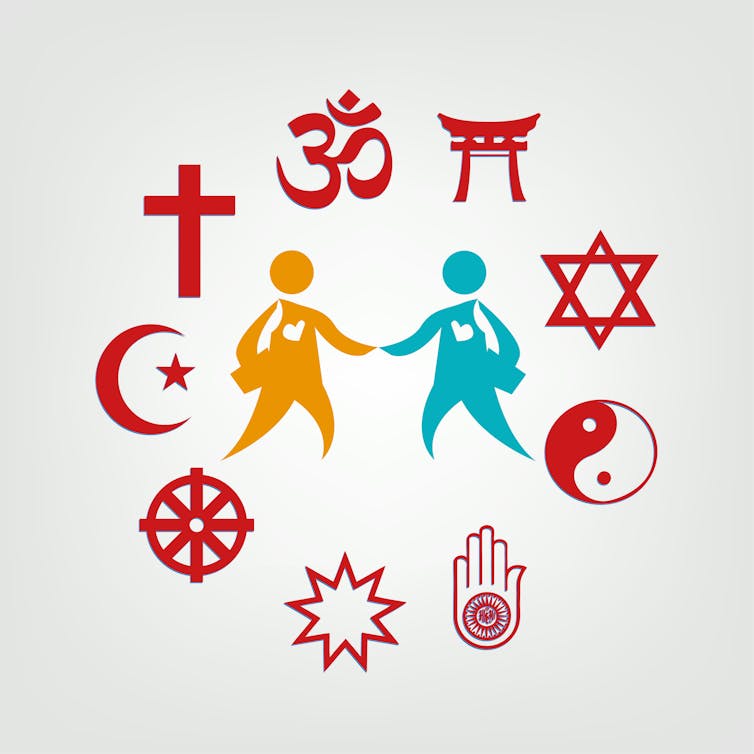
Experts in autocracies have pointed out that it is, unfortunately, easy to slip into normalizing the tyrant, hence it is important to hang on to outrage. These incidents which seem to call for the efforts of the Greek Furies (Erinyes) to come and deal with them will, I hope, help with that. As a reminder, though no one really knows how many there were supposed to be, the three names we have are Alecto, Megaera, and Tisiphone. These roughly translate as “unceasing,” “grudging,” and “vengeful destruction.”
A few weeks ago (three, to be exact) I did a mammoth article on the IRS, with emphasis on why it’s so easy for Repubicans to cheat (and of course, when they cheat the IRS, it is ALL OF US who are getting cheated. I tend to take it personally.) Now, they have come up with yet a new wrinkle to cheat us all financially, and to combine it with straight-up misrepresentation by posing as actual churches when they aren’t.
==================================================================
What’s a church? That can depend on the eye of the beholder or paperwork filed with the IRS

Rawpixel.com/Shutterstock.com
Samuel Brunson, Loyola University Chicago
In 2016, the Billy Graham Evangelistic Association told the Internal Revenue Service that it no longer wanted to be treated merely as a tax-exempt religious organization, free from the obligation to pay taxes on its income. Instead, the association – a Charlotte, North Carolina-based group that produces evangelical events, celebrates the legacy of Billy Graham and proselytizes about Jesus Christ – wanted the IRS to recognize it as a church.
The IRS complied with its request.
Similar religious groups lacking pews and parishioners are making the switch, too, including Focus on the Family, which promotes Christian heterosexual marriage; and the Navigators, an interdenominational Christian group active on college campuses.
In spite of being registered with the IRS as “churches,” these organizations and others like them don’t claim to be churches publicly. In fact, Gideons International – an association of businessmen and their wives who leave Bibles in hotel rooms – says on its website that it is neither a denomination nor a church. And yet, for tax purposes, Gideons claims to be a church.
Why would an already tax-exempt religious group want the government to treat it as a church? Because the rules governing churches are less strict.
501(c)(3) groups
While reasons for this growing trend vary, these groups may share one main goal: keeping their donor lists private to protect their donors from public criticism or backlash.
As a professor who studies how tax laws affect churches and other tax-exempt organizations, I believe these groups overestimate the benefits their donors will receive if the groups are treated as churches. Even so, I’m concerned that groups taking this step are reducing the flow of valuable information about these organizations to the public.
To see why I’m worried, here’s some background about what’s probably the best-known section of the U.S. tax code, section 501(c)(3). It provides two benefits to organizations that meet its requirements for tax exemption. First, these approximately 1.5 million groups – including everything from familiar nonprofits like the Red Cross to National Public Radio to the lesser-known First Church of Cannabis and the Satanic Temple – generally don’t have to pay taxes on their income.
Second, some of their donors can deduct their donations from their taxable income through the charitable deduction, creating an incentive to support those groups. While groups must be organized as nonprofits to qualify for the federal tax exemption, not every nonprofit is exempt.
Eligibility requires pursuing a specific purpose, such as religion, education or charity.
These organizations face obligations to maintain their exemptions, such as filing special paperwork with the IRS every year known as a Form 990. It requires disclosing some information, including who sits on its board of directors and the highest-paid employees. Tax-exempt groups also must share select financial information, including the value of their assets, their expenditures and their revenue.
As you may know, the IRS can’t violate your privacy by releasing your tax return. By contrast, it must make all 990 forms part of the public record.
An exception
As I explained in Dialogue: A Journal of Mormon Thought, an academic publication, no tax-exempt organization had to file any documentation with the IRS for the first 30 years following the modern federal income tax’s inception in 1913. That changed in 1943, when Congress decided to make all of these groups except the religious ones – whether or not they function as churches – file of annual tax returns.
By 1969, in the wake of the discovery of a number of organizations abusing their tax exemptions, Congress had begun to feel like the government needed more information. That year, the House of Representatives passed a bill that would have eliminated the filing exception for all religious organizations.
The House’s bill galvanized the religious community, which lobbied the Senate. Leaders like Ernest Wilkinson, the president of Brigham Young University, and the U.S. Catholic Conference argued against this legislation.
They claimed that the added paperwork would be burdensome and expensive for churches without generating additional tax dollars. They also asserted that disclosure was unnecessary because religious donors make charitable contributions based on religious obligations, not due to concern regarding the financial health of churches.
Ultimately, Congress split the proverbial baby. As of 1970, religious organizations were no longer exempt from filing 990 forms. The government did, however, exempt from this obligation churches, church associations and their “integrated auxiliaries” – that is, organizations associated with a church that receive financial support primarily from that church.
Today churches, synagogues, mosques and other houses of worship remain free from the obligation to file the forms the IRS makes all other tax-exempt organizations submit.

Crystal Eye Studio/Shutterstock.com
Let’s be a church!
To decide whether something really is a church, at least for tax purposes, the IRS considers 14 criteria.
The criteria include the existence of a congregation, the occurrence of religious services and the ownership of property where people pray.
These criteria are vague, at least partly because of the religious freedom granted by the Constitution. That vagueness lets some organizations meet the IRS definition of “church” even if they really aren’t.
For instance, Focus on the Family allegedly claimed its cafeteria was an “established place of worship” because the group’s members occasionally pray there. It also changed the job titles of all 600 of its employees to “minister.” Those steps most likely fail to meet the standards that guided the IRS when it laid out its 14 criteria.
But the federal tax agency lacks the funding and staff it would need to verify these claims, leaving the IRS with a limited ability to challenge Focus on the Family’s assertions. (The group has told The Washington Post that its main reason to become a “church” for tax purposes was “to protect the confidentiality of our donors.”)
If the IRS recognizes a religious organization as a church, the public loses access to significant information. The public does not, however, lose any information about the organization’s donors, notwithstanding these groups’ stated goals in transitioning to churches.
Currently, tax-exempt groups required to file 990 forms must tell the IRS about their “substantial contributors” – basically, donors who give more than US$5,000 annually. But the IRS can’t release these donor lists to the public.
That is, becoming a church for tax purposes eliminates an obligation to file 990 forms, but this newfound opaqueness does nothing additional to shield donors from public scrutiny because donors never faced public scrutiny in the first place.
As long as churches don’t have to share their financial details with the IRS, religious groups will have an incentive to act like churches for tax purposes. But the incentive doesn’t have to exist. I believe that if Congress were to heed its 1969 goals and eliminate the filing exemption for churches, other religious organizations would not feel pressure to act like churches.
And society would get more access to the information it needs to oversee tax-exempt organizations.
[ Get the best of The Conversation, every weekend. Sign up for our weekly newsletter. ]![]()
Samuel Brunson, Professor of Law, Loyola University Chicago
This article is republished from The Conversation under a Creative Commons license. Read the original article.
==================================================================
So, the biggest benefit of this scam is that, as churches, they can “protect the identity of their donors.” The other benefit is they can avoid filing paperwork, which is a financial benefit, as it saves time and money – how much depends on now much paper there is and how much you pay your staff – but probably minimal. However, not having to file adds to the secrecy. I kind of thought that, at least in principle, religions stopped keeping secrets about the time the Eleusinian Mysteries died out. But of course cons and grifters depend on secrecy and misdirection.
Alecto, Megaera, and Tisiphone, I absolutely realize that the IRS doesn’t even begin to have the funding and resources to investigate everything these groups are doing. So, if we are ever going to be able to enforce tax laws, the first step will be rebuilding the IRS. Please help us remember that if and when we ever get into a positon to do something about it.
The Furies and I will be back.
12 Responses to “Everyday Erinyes #204”
Sorry, the comment form is closed at this time.

Thanks for illuminating this questionable practice Joanne. Thankfully, here in CA most churches have to file tax documents (even an ordinary rummage sale generates enough income for the trigger, for example)…
As soon as a religious group wants to be known by the IRS as a church it becomes clear that they’re all about money, not religion. If the IRS opens the door fo one, it opens it for all, forcing it to come up with all kinds of criteria, a job for which it isn’t really equipped, to have some semblance of control over the proliferation of ‘churches’. They have opened a fiscal can of worms and with ‘religion’ being so powerful an influence in politics and legislation the IRS is unlikely to close that can again.
As you say, Joanne, even the furies won’t be of much help here.
Under the circumstances, I can only think of one valid response. We must incorporate the Church of the Ellipsoid Orb. So you prefer Rev. TomCat, Bishop TomCat, or Pope TomCat I?
I’ve always had a sneaking preference for “The Right Reverend.” The Right Reverend TomCat sounds just right. Pun intended.
Right on!
I didn’t know the extent of the criteria that must be shown to be a church.
Lots and lots of paperwork. Wow!
A most informative, interesting, and well researched post.
Thanks, Joanne (and Furies)
I wonder if there might be lone more reason for an organization to call itself a church . As I understand the laws protecting freedom of religious expression, churches are exempt from civil rights laws. So the Church of the Ellipsoid Orb could discriminate against anyone its Pope TomCat chooses.
Or more seriously , a white supremacist church could totally legally choose to deny their charities to people of color.
Or a cake baker church or a florist church could lawfully deny serving members of the LGBTQ community.
Margaret Goodman (messgwg@gmail.com)
I never thought of that because I was concentrating on the money-laundering aspect. But yeah, they could. You are truly devious. I know that you only use it for good, though
Welcome Margaret. I hope you will become a regular here.
To clarify our policy, under the Right Reverend TomCat, the Church of the Ellipsoid Orb shall discriminate against all who discriminate against others.
“Good” Christians lying in order to cheat for their Jesus, special!
Bottom Line: Right-wing political PACs masquerading as 501(c)3s.
DROP “church” 501(c)3 sham status!
Interesting. Who would of ever thought these type of organizations would use these type of illegal tactics?
Thanks Joanne